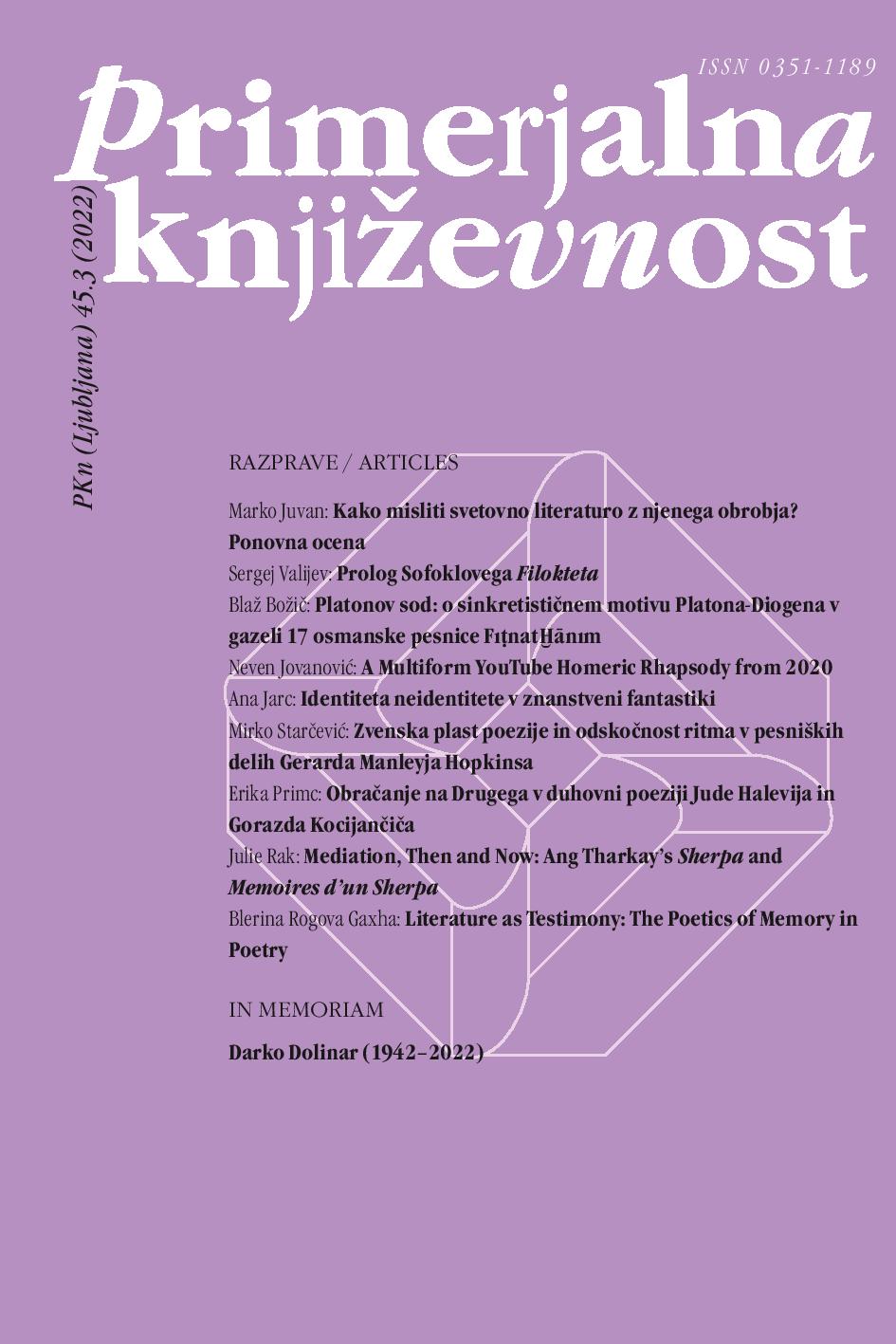A Multiform YouTube Homeric Rhapsody from 2020
DOI:
https://doi.org/10.3986/pkn.v45.i3.04Keywords:
antiquity, Greek literature, literary reception, Homer: Odyssey, online eventsAbstract
The Odyssey ‘Round the World was a collaborative public reading of Homer’s Odyssey published on YouTube in December 2020, at the height of the COVID-19 pandemic. Coming from the larger Reading Greek Tragedy Online initiative and organized by the Harvard University Center for Hellenic Studies, the reading featured performances of every book of the Odyssey by students, faculty, actors and laypersons from about twenty countries. The contributors were encouraged to perform in their own language, but they could also use the Ancient Greek, or any other language; the text could have been read, recited, sung, acted. The result, still available online, is briefly described here. Reflecting on the event I notice that public readings and YouTube videos are, as genres and cultural activities, rarely included in surveys of Homeric reception. The Odyssey ‘Round the World event is distinguished by its prominent diversity; in this way, the event connects with current debates on “Classics” as an academic discipline and with the theory of multiform, diachronic development of Homeric poems. The event also demonstrates both advantages and limits of the technology, and, most importantly, it makes us aware of the distance between Homeric poems as performance in ancient Greece and the usual way we deal with them as our reading matter.
References
“ANU Acknowledgment of Country.” <em>Australian National University</em>. Web. Access 17 Oct. 2022. https://services.anu.edu.au/human-resources/respect-inclusion/anu-acknowledgment-of-country/.
Adler, Eric. <em>Classics, the Culture Wars, and Beyond</em>. Ann Arbor, MI: University of Michigan Press, 2016.
Barlik, Memet. “Ozan and Dengbej: The Lost Voices of Oral Tradition in Turkey.” <em>Social Sciences Studies Journal</em> 63.6 (2020): 2186–2201.
Burgess, Jonathan. “Recent Reception of Homer: A Review Article.” <em>Phoenix</em> 62.1–2 (2008): 184–195.
Foley, John M. <em>A Companion to Ancient Epic</em>. Malden, MA: Blackwell Publishing, 2013.
Hall, Edith. <em>The Return of Ulysses: A Cultural History of Homer’s Odyssey</em>. Baltimore, MD: Johns Hopkins University Press, 2008.
Lombardo, Stanley. <em>Odyssey</em>. Indianapolis, IN: Hackett, 2000.
OECD. “Recognition of Non-formal and Informal Learning – Home.” Web. Access 17 Oct. 2022. https://www.oecd.org/education/skills-beyond-school/recognitionofnon-formalandinformallearning-home.htm.
McDaniel, Spencer. “The Debate about Classics Isn’t What You Probably Think It Is.” <em>Tales of Times Forgotten</em>. 26 Feb. 2021. Web. Access 17 Oct. 2022. https://talesoftimesforgotten.com/2021/02/26/the-debate-about-classics-isnt-what-you-probably-think-it-is/.
McWhorter, John. “The Problem with Dropping Standards in the Name of Racial Equity.” <em>The Atlantic</em>. 7 June 2021. Web.
Nagy, Gregory. <em>Homer the Classic</em>. Washington, DC: Center for Hellenic Studies, 2008.
Nagy, Gregory. <em>Homeric Questions</em>. Austin, TX: University of Texas Press, 1996.
Nagy, Gregory. <em>Plato’s Rhapsody and Homer’s Music: The Poetics of the Panathenaic Festival in Classical Athens</em>. Hellenic Studies Series 1. Washington, DC: Center for Hellenic Studies, 2002.
Nagy, Gregory. <em>Poetry as Performance: Homer and Beyond</em>. Cambridge: Cambridge University Press, 1996.
Poser, Rachel. “He Wants to Save Classics from Whiteness: Can the Field Survive?” <em>The New York Times</em>. 2 Feb. 2021. Updated 25 Apr. 2021. Web.
Ryder, Andrew. <em>The Challenge to Academic Freedom in Hungary: A Case Study in Authoritarianism, Culture War and Resistance</em>. Berlin: Walter de Gruyter, 2022.
Skafte Jensen, Minna. “Performance.” Foley, John M. <em>A Companion to Ancient Epic</em>. Malden, MA: Blackwell, 2005. 45–54.
Turner, Victor. “Liminality and Communitas.” <em>The Ritual Process: Structure and Antistructure</em>. Chicago, IL: Aldine Publishing, 1969. 94–113, 125–130.


